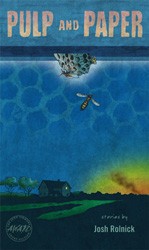To “host” Josh at your next book club meeting, request him through JBC Live Chat.
The other day, I was walking home from work in Brooklyn, N.Y., trying to cross 7th Avenue at rush hour, listening to the final audiobook chapter of Francisco Goldman’s Say Her Name.
I don’t recommend trying this at home.
Goldman’s book, officially a novel, is the true story of the author’s relationship with Aura Estrada, a young Ph.D. student he married at a point in his life when he had all but given up trying to find love. It’s a beautiful story with a horrible ending – Aura dies in a freak bodysurfing accident as the two are vacationing together in Mexico.

The love Goldman describes is honest, passionate, and real; Aura’s death, all the more tragic for being so random and senseless. (“Fue una tonteria, Mami,” Aura tells her mother after the accident, just hours before she dies. “It was a stupidity, Mami.”) Goldman wonders: if she had simply ridden a different wave, if he had been able to afford to stay at a different beach – would her life still be intact? Would his?
At the time of her death, Aura was at the start of a promising literary career. And, as the book ends, Goldman travels to Paris to visit La Ferte, a clinic Aura had planned to use as the model for a hospital in her novel. He climbs the stairs, wondering what Aura’s characters would have felt, then shifts suddenly and speaks to her directly.
“Do with La Ferte what you will, my love,” he writes. “I know it will be great.”
I approached the 7th Avenue subway. Throngs of people welled up from the station, and my eyes filled with tears. I held my breath, trying to tamp down the emotion. Come on, Rolnick, I told myself. They can see you.
I hit 30-second rewind so I could listen again. Tears flowed freely. I rewound again. Do with La Ferte what you will, my love. There she was, plain as day. Aura. Alive, once again. By the time I reached my apartment, I was dodging cars I could hardly see.
Why was I crying like that? Because I love people, too, and why does everything have to be so damn tenuous in this world? Also, I think, they were tears of gratitude – for a book, words on a page, that had snapped me out of my daily routine, had moved me, reminding me that this train we’re all riding may be heartbreaking and beyond our comprehension at times, but at least we’re all riding it together.
Our sages tell us that Moses “convoked the whole Israelite community” after the golden calf incident, partly because he wanted to “restore the sense of unity and shared purpose” among his people (Genesis 35:1). Is the call of stories any less noble?
Writers write, the author Richard Ford concludes in a 1988 Harper’s essay that I’ve returned to again and again, “not … to appeal to a particular readership, but to discover and bring to precious language the most important things they were capable of, and to reveal this to others with the hope that it will commit an effect on them – please them, teach them, console them. Reach them.”

Isn’t that why we read? I mean, sure, it’s nice to be entertained. Sometimes, we want to be scared or thrilled or transported. But doesn’t the real payoff come when a book reconnects us to that vital thing inside us that reminds us we are alive?
When Doree gets out of the bus to help a young boy hurt in a car wreck and realizes she doesn’t have to go back to her abusive husband. When Jan Valjean is reunited with Cosette. When Dumbledore tells Harry at the end of a hard and wearying journey that death “really is like going to bed after a very, very long day.”
Alice Munro. Victor Hugo. J.K. Rowling. The authors who have moved you may be different, but I have no doubt, if you’re reading this, you know what it means for a book to lift you up.
“Writing and reading decrease our sense of isolation,” Anne Lamott concludes in Bird by Bird. “They deepen and widen and expand our sense of life: they feed the soul. When writers make us shake our heads with the exactness of their prose and their truths, and even make us laugh about ourselves or life, our buoyancy is restored. We are given a shot at dancing with, or a least clapping along with, the absurdity of life, instead of being squashed by it over and over again. It’s like singing on a boat during a terrible storm at sea. You can’t stop the raging storm, but singing can change the hearts and spirits of the people who are together on that ship.”
A song every day, Rabbi Akiva said. A song every day.
If you’d like to spend an evening together belting it out, I’d be honored to join you.
Josh Rolnick is a short story writer, author of the collection Pulp and Paper, which won the John Simmons Short Fiction Award. He is a faculty lecturer at the Johns Hopkins MA in Writing Program, an instructor at Sackett Street Writers, and fiction editor at Paper Brigade, the literary annual of the Jewish Book Council.



